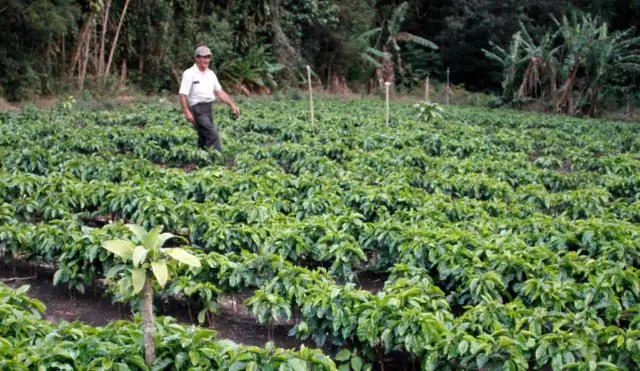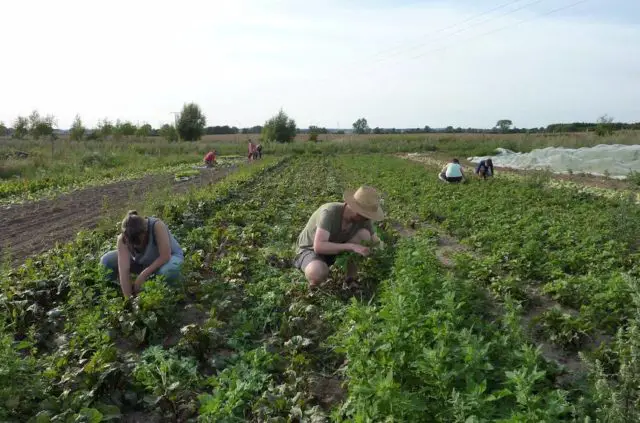
To honor the people who give their lives cultivating the land, women, men, boys and girls, simple peasants, is to recognize our lack of agriculture, the almost extermination of the small producer under the dictatorship of agribusiness that monopolizes our lands and benefits a few and not even its production is for national consumption, thus threatening our food security.
The data is overwhelming: 60% of the national production of our country is for the export of bananas, pineapple, coffee, palm oil, plants, foliage, flowers, cassava and melon (FAO, 2018). All produced as monocultures that contributes to us being the first place in the world as an importer of pesticides an agropoisons (FAO, 2016). Far ahead of our competitors in tropical America like Colombia, Ecuador, Honduras and Brazil.
It’s too much poison
Yes, it is the best sentence that can describe pesticides and other substances of synthetic origin used in agribusiness. Widely associated with multiple health problems, such as: cancer, deformations in fetuses, learning problems, allergies, acute poisonings and therefore death. Also responsible for watershed contamination, today they are even responsible for deaths of sealife.
According to FAO statistics, in 2014 Costa Rica consumed: 24.56 Kilograms of active ingredients (the chemical compound that exerts the pesticidal action) per hectare per year (ai / ha / year), followed by Colombia with 17, 50 and China with 14.81. While, in fertilizers according to World Bank data, we are first place in the world with the highest consumption of fertilizers, exceeding 5 times the world average, Costa Rica has an average consumption of 705 kg while the world range is around 140 kg per hectare of arable land, which places us well above hundreds of countries and regions.
This shows that we are forcing agriculture in our country to reach a production-pollution threshold, to earn more money with increasing environmental damage that is experienced in the short, medium and long term.
Systematic studies by the Regional Institute for Studies on Toxic Substances (IRET) and global statistics show that the use and abuse of agricultural poisons has increased significantly in Costa Rica, without having increased the agricultural areas in the country.
The depletion of the agricultural frontier explains the abuse of poisons. The amount of pesticides imported by Costa Rica has increased 3.14 times since 1977. Only in pesticides imported 194,817 tons of active ingredient from 1977 to 2016.
In addition, the import of insecticides, fungicides and other poisons is among the top 15 imported products and generated outlays to the country for 139.6 million US $ (PROCOMER, 2017), all at the cost of a large dispossession and a growing land concentration in few companies.
We are running out of land
Let’s look at an example: 60% of palm oil production is in the hands of transnational corporations and large cooperatives. With an aggressive but silent expansion, it went from 57,000 hectares in 2010 to 67,562 in 2013 to an estimated 91,500 hectares by the end of 2018. In Bananas, 52% of production is in the hands of transnational corporations (Chiquita, Dole, BANDECO), The rest are planted by independent producers who sell to transnational corporations that export and market.
Our food security in crisis
While we hand over our best lands to transnational companies for the export of monocultures, we are importing the main products for our daily consumption: common beans, paddy rice, yellow corn, soybeans and wheat.
A 2017 calculation ensured that we would need an additional 288,000 hectares of white corn, 160,000 of yellow corn, 45,000 of beans and 86,000 of rice hectares if we want to cover the national demand. But how to ensure our basic grains if all of our land is concentrated in the agroexport businesses.

In 2018 the world food crisis was declared, and even the neoliberal government in Costa Rica, the historical responsible for this ruin, recognized the importance of recovering our food sovereignty not only due to the increase in prices but also due to the shortage of food in the world.
This crisis should have served to raise awareness of the urgency for overcoming the era of agrochemicals and mega agribusiness, and seriously strive to regain our food sovereignty by fair and sustainable management of arable land.
There is not just need for more food production, but most importantly, justice and equity are needed. There are many ways to control pests without using chemical poisons. Every day many more rural families are improving their income, their health and the environment with organic agriculture that in a few years is growing rapidly to become a fairer and more accepted option.

